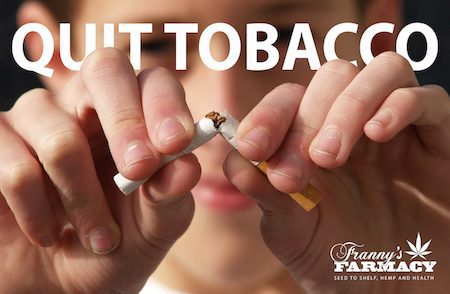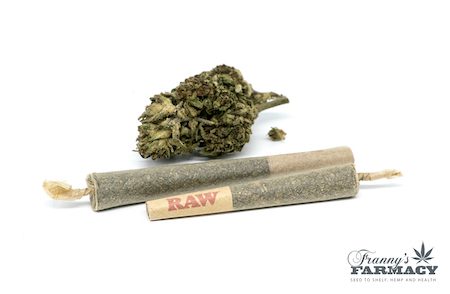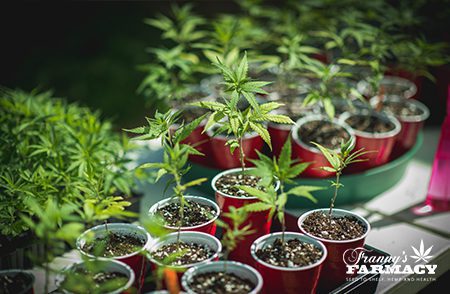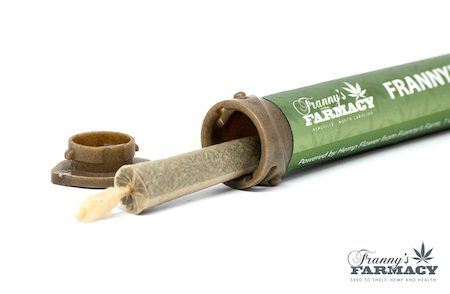It’s a new year and you have decided to quit a bad habit. Quitting any addiction is not just a test of will; it is a chemical reaction in our body that drives behavior. Luckily, CBD is showing some potential in aiding the process of quitting. There are two common addictions that many struggle with: tobacco from cigarettes and THC from cannabis. While CBD research is ongoing, it may be a possible aid for quitting chemical addiction.
 WHY QUIT TOBACCO?
WHY QUIT TOBACCO?
Smoking tobacco is a pretty harsh vice. Two things happen when you smoke: the nicotine causes your blood vessels to constrict and the tobacco causes your blood to thicken. These two reactions have a pretty long list of correlative issues: cancer, poor lung quality, and increased signs of aging. THC, in heavy use, may be connected to dopamine and serotonin imbalances. These imbalances could be linked to psychological issues such as bipolar disorder and depression (source1, source2).
A GENERAL UNDERSTANDING OF ADDICTION
Why do humans use addictive substances? Often, we are in pain. Whether that is psychological or physical, substance abuse is usually coming from people attempting to self-medicate. Our bodies have a set amount of hormones, and events like an inadequate amount of sleep can throw you out of balance. Abusing exogenous compounds such as THC or nicotine can cause our brains to create a hormonal imbalance. This imbalance leads to dependence – and thus begins the addiction.
HORMONES IN ADDICTION
Addiction is a very complex set of chemical reactions that are being studied, while still not fully comprehended. The main chemicals involved in addiction are a group of hormones known as neurotransmitters – specifically serotonin and dopamine.
Dopamine is a little more complicated than you may remember. It is not just a “feel good” hormone; it is more of a learning hormone. For example, Pavlov trained dogs to associate a bell with their meals. The bell eventually caused the dopamine spike, not the food. So, dopamine works much more like a learned association hormone that causes a craving (source).
Serotonin is a mood-stabilizing hormone. Serotonin can be responsible for staving off depression. Substances like THC and Nicotine may have antidepressant qualities – but when abused, damage the body’s ability to use serotonin properly (source).
 ENTER CBD
ENTER CBD
CBD is a non-intoxicating chemical of the cannabis plant. CBD acts as a supplement to our bodies’ natural production of endocannabinoids. When ingested, CBD binds to two receptors: CB1 and CB2. Most CB1 receptors are in the brain and deal with mood and mental function. CB2, on the other hand, mainly deals with the physical side, our immune system, and inflammation (source).
USING CBD FOR QUITTING TOBACCO
In a 2013 study, 24 cigarette smokers divided into halves — with twelve given a placebo inhaler and the remaining twelve given a CBD inhaler. The study found the placebo group did nothing, but the CBD group cut down smoking tobacco by 40%. The reduction in smoking could be from a couple of actions CBD takes on the body. CBD may manage stress hormones like cortisol. Most addicts reach for their substance of choice in times of stress. CBD may also be a potent agent in decreasing inflammation and aiding the immune system. This is interesting because there appears to be a link between the body’s inflammatory response and substance abuse. These studies are impressive, but as with most CBD research, it is still in its infancy (source1, source2).
USING CBD FOR QUITTING THC
The use of CBD is more straightforward when dealing with THC abuse. In your body, you have several CB receptors. While getting “high” from THC, the THC molecules bind to these CB receptors. CBD covers these receptors making the user less high. CBD may also be able to assist in balancing serotonin receptors by removing some of the harmful effects of THC. For those struggling with THC abuse, utilizing CBD may aid in the process of cutting its use. But again, the research is in its early days (source).
 THE CYCLE OF QUITTING
THE CYCLE OF QUITTING
If you’re pursuing a healthier path, congratulations! Quitting has a cycle: stopping, withdrawal, craving, relapse, and repeating the cycle until you have reached its conclusion. This is a basic model of quitting. CBD may provide some benefit, particularly in the craving and withdrawal phases of quitting (source).
Cravings often come from your environment. We condition our bodies to want things at certain times. These cravings work similar to hunger. Most people eat at a similar time, hungry or not. Addicts usually reach for their substance of choice during stressful moments. Thus we can train our bodies to become stressed and reach for our substances of choice. CBD may help fight stress, so it stands to reason that CBD may help dampen cravings. With cravings dulled, you might curb use of an addictive substance.
Withdrawal is the physical reaction to a change in substance use. Symptoms of withdrawal can range, but most addicts report similar stories: weight gain, stress, and insomnia, to name a few. CBD might help manage these symptoms as well. On top of CBD’s potential to help get our bodies getting back to homeostasis, remember, addiction is a chemical imbalance issue. CBD may aid in weight management, lowering stress hormones, and helping you get to sleep. As a result, some rehabilitation clinics have begun to incorporate CBD to combat withdrawal symptoms.
IN SUMMARY
CBD is still in the early days of its research. However, CBD does appear to show some promise based on medical data and case studies on addictive behavior. CBD has a long list of potential benefits and appears to undo some of the harm done by addiction. Please do your homework. Consult with a medical professional before implementing any protocols for quitting a harmful substance (source).
Guest Author : Sean Gallagher

 ENTER CBD
ENTER CBD THE CYCLE OF QUITTING
THE CYCLE OF QUITTING